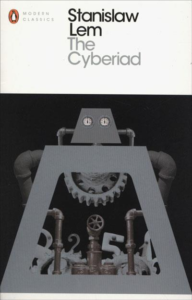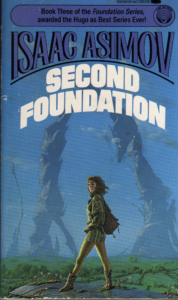The early Cold War era was a time not just of great sci-fi cinema, but also of awesome sci-fi literature… and, contrary to popular belief, it wasn’t all doom and gloom either.
Here are a couple of books, by two giants in the field, whose extremely fun approach to science fiction anticipated the sensibilities of much of today’s pop culture, including the tone of this year’s MCU entries Guardians of the Galaxy vol. 3 and Ant-Man and the Wasp: Quantumania.

THE CYBERIAD
(Stanislaw Lem, 1965)
“One day Trurl the constructor put together a machine that could create anything starting with n. When it was ready, he tried it out, ordering it to make needles, then nankeens and negligées, which it did, then nail the lot to narghiles filled with nepenthe and numerous other narcotics. The machine carried out his instructions to the letter. Still not completely sure of its ability, he had it produce, one after the other, nimbuses, noses, nymphs, naiads, and natrium. This last it could not do, and Trurl, considerably irritated, demanded an explanation.
‘Never heard of it,’ said the machine.”
The opening paragraph pretty much sets the tone for this whole collection of humorous short stories by Stanislaw Lem. Subtitled Fables for the Cybernetic Age, this book consists of a series of surreal tales revolving around two competing ‘constructor’ robots, Trurl and Klapaucius, involved in a game of one-upmanship that usually culminates in the construction of outlandish – and often destructive – machines (rendered in suitably playful illustrations by Daniel Mróz). In other words, be warned: this isn’t one of Lem’s classic ventures into hard science fiction, like Solaris. The science in The Cyberaid is as unabashedly – and delightfully – absurd as anything in Hitchhiker’s Guide to the Galaxy!
After three cartoonish preliminary stories, the book delivers the first piece of genius with ‘The Trap of Gargantius,’ a parable – somehow equal parts misanthropic and humanist at the same time – about two warring alien kingdoms whose attempts to develop their armies’ efficiency go wildly astray. Given when and where it was written, it’s very hard not to read this as a satire of the nuclear arms race, especially since Lem situates the narrative in a world of insane authoritarianism…
“The kingdom to which Trurl repaired was ruled by King Atrocitus. He was militarist to the core, and an incredible miser besides. To relieve the royal treasury, he did away with all punishments except for the death sentence. His favorite occupation was to abolish unnecessary offices; since that included the office of executioner, every condemned citizen was obliged to do his own beheading, or else – on rare occasions of royal clemency – have it done by his next of kin.”
…and overblown espionage:
“His greatest reform was the nationalization of high treason. As the neighboring kingdom was continually sending spies, he created the office of Royal Informer, who, through a staff of subordinate traitors, would hand over State secrets to enemy agents for certain sums of money.”
The translation from Polish to English was made by Michael Kandel, who not only had to do justice to the various plays on words, but at one point had to come up with several impressive verses (in what is arguably the most hilarious tale, where Trurl builds a pre-Chat GPT machine that can write poetry), including a whole poem about a haircut, ‘lofty, noble, tragic, timeless, full of love, treachery, retribution, quiet heroism in the face of certain doom’ – and ‘cleverly rhymed, and every word beginning with the letter s!!’ Kandel did an astonishing job: The Cyberiad reads superbly. Practically every sentence earns, at the very least, a smile (‘Of the arts Atrocitus supported only those that entailed little expense, such as choral recitation, chess and military calisthenics.’).
It reminds me a lot of Terry Pratchett. Among all the frantic slapstick involving body-switching, convoluted mind games, and a host of eccentric – and usually quite greedy – space tyrants, Stanislaw Lem is able to combine witticisms with a sense of fable-like adventure (‘To the one who inquires what he should do if a real quake descends upon his vessel, most wags will answer that then it is quite enough to heave a sigh, there being little time for prayer or the writing of wills, and as for the eyes, these may be open or shut according to personal preference, for the fire will burn them out in any event.’). Plus, like Pratchett, his comedy sometimes takes the form of a parody of both specific political systems and more general structures of power – in one of my favorite tales, ‘The Seventh Sally or, How Trurl’s Own Perfection Led to No Good,’ an egomaniac scientist creates an entire civilization from scratch just so that an exiled king can vent his despotic urges.
The book reaches its peak in ‘Tale of the Three Storytelling Machines of King Genius,’ a delirious, mischievous, and occasionally debauched labyrinth of narratives within narratives within narratives that reads like a missing link between Arabian Nights and Futurama.
Like I said, the tone could hardly be more distant from that of Solaris. And yet, if you squint, you can find some continuity in the way both books mimic the jargon of specialized academic theories and debates, creating tension between the highly logical and the seemingly irrational… It’s just that The Cyberiad brazenly plays this contrast for laughs:
“Everyone knows that dragons don’t exist. But while this simplistic formulation may satisfy the layman, it does not suffice for the scientific mind. The School of Higher Neantical Nillity is in fact wholly unconcerned with what does exist. Indeed, the banality of existence has been so amply demonstrated, there is no need for us to discuss it any further here. The brilliant Cerebron, attacking the problem analytically, discovered three distinct kinds of dragon: the mythical, the chimerical, and the purely hypothetical. They were all, one might say, nonesistent, but they nonexisted in an entirely different way. And then there were the imaginary dragons, and the a-, anti and minus-dragons (colloquially termed nots, noughts and oughtn’ts by the experts), the minuses being the most interesting on account of the well-known dracological paradox: when two minuses hypercontiguate (an operation in the algebra of dragons corresponding roughly to simple multiplication), the product is 0.6 dragon, a real nonplusser. Bitter controversy raged among the experts on the question of whether, as half of them claimed, this fractional beast began from the head down or, as the other half maintained, from the tail up.”

SECOND FOUNDATION
(Isaac Asimov, 1953)
“The First Galactic Empire had endured for tens of thousands of years. It had included all the planets of the Galaxy in a centralized rule, sometimes tyrannical, sometimes benevolent, always orderly. Human beings had forgotten that any other form of existence could be.
All except Hari Seldon.
Hari Seldon was the last great scientist of the First Empire. It was he who brought the science of psycho-history to its full development. Psycho-history was the quintessence of sociology; it was the science of human behavior reduced to mathematical equations.
The individual human being is unpredictable, but the reactions of human mobs, Seldon found, could be treated statistically. The larger the mob, the greater the accuracy that could be achieved. And the size of the human masses that Seldon worked with was no less than the population of the Galaxy which in his time was numbered in the quintillions.”
The excerpt above is from Second Foundation’s prologue, filling in new readers – and perhaps reminding old ones – about the premise of the series and what took place in the first two volumes (discussed here and here). Although elegantly written, this isn’t really necessary, given that the main text competently weaves all required exposition into the ensuing narration and dialogues, but I guess it can help reassure hesitant or impatient readers fearful of traveling blind. That said, unless you find yourself stuck in a library or a bookstore without any appealing alternative, I don’t recommend making Second Foundation your starting point… Although, like in the previous novels, the chapters – set decades apart along the series’ extensive timeline – were initially published separately (in this case, as two novellas in Astounding Magazine, in 1948 and 1950), so much of the book cleverly pays off what Isaac Asimov spent years setting up (most notably the cliffhanger at the end of Foundation and Empire) that it’s way more satisfying to approach this as the culmination of a trilogy, rounding up one of the greatest masterpieces of the genre.
Not that this work doesn’t stand on its own… For one thing, its two stories are quite cohesive thematically. They both revolve around the efforts of the successors of the First Foundation (the one that Hari Seldon set up to eventually replace the decaying Galactic Empire) to find the mysterious Second Foundation (the one that Hari Seldon supposedly set up as a backup plan… or as something else entirely). And they’re particularly adventurous as well, delivering rip-roaring quests in which opposing figures fight through psychic powers – including at least one mutant! – and there are so many conspiracies within conspiracies that characters cannot even trust themselves. So, yeah, while many of the thrills once again derive from intellectual confrontations resolved through debate and deductive reasoning, some of Second Foundation nevertheless brought to my mind Grant Morrison’s New X-Men comics, with their telepathic battles and super-geniuses outsmarting each other.
Instead of Frank Quitely’s art, though, we get Asimov’s descriptions:
“The cool, overhead warning light flickered. He could follow the progress of the man who had entered the palace and, almost against his will, he felt the soft wash of emotional content touch the fibers of his brain.
He recognized the identity without an effort. It was Channis. Here the Mule saw no uniformity, but the primitive diversity of a strong mind, untouched and unmolded except by the manifold disorganizations of the Universe. It writhed in floods and waves. There was caution on the surface, a thin, smoothing effect, but with touches of cynical ribaldry in the hidden eddies of it. And underneath there was the strong flow of self-interest and self-love, with a gush of cruel humor here and there, and a deep, still pool of ambition underlying all.”
Like with The Cyberiad, it’s tempting to see the onset of a Cold War mindset in this paranoia-inflected saga about elusive enemies and a powerful-yet-invisible menace. Sure, you may argue that supernatural elements like the ability to read – and surgically reprogram – minds feel somewhat out-of-place in such a rationalist series, but consider how in tune they were with the zeitgeist, kickstarting a decade when American culture seemed obsessed with psychiatry, subliminal advertisement, and foreign ideological infiltration, including the possibility that Korean War veterans had been hypnotized by China. Indeed, I’m surprised Second Foundation doesn’t earn a mention in Daniel Pick’s book Brainwashed: A New History of Thought Control.
The novel’s other remarkable feature is the inclusion of more female characters, most notably the plucky Arcadia (aka Arkady), the 14-year-old granddaughter of the series’ only prominent woman in the previous volumes, Bayta Darell. The unchallenged assumption that authority would simply remain an exclusive masculine privilege for fifty thousand years into the future is one of these books’ most depressing dimensions (perhaps there was some kind of galactic Men’s Rights uprising somewhere in-between, reversing all the gender-related social progress…). In any case, at least Arkady is a pretty cool protagonist – like a true geek, she consciously approaches her predicaments as the pulpy tale of intrigue they effectively are. Thus, not only does she dominate every scene she’s in, she also manages to see farther than the tight-ass grown-ups around her:
“‘Tell me, how did you know your father was expecting me?’
‘Oh, that was easy. Last week, he received a Personal Capsule, keyed to him personally, with a self-oxidizing message, you know. He threw the capsule shell into the Trash Disinto, and yesterday, he gave Poli – that’s our maid, you see – a month’s vacation so she could visit her sister in Terminus City, and this afternoon, he made up the bed in the spare room. So I knew he expected somebody that I wasn’t supposed to know anything about. Usually, he tells me everything.’
‘Really! I’m surprised he has to. I should think you’d know everything before he tells you.’
‘I usually do.’ Then she laughed.”
